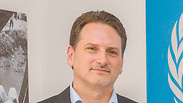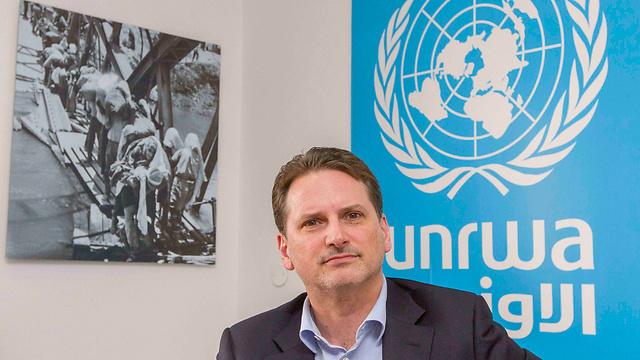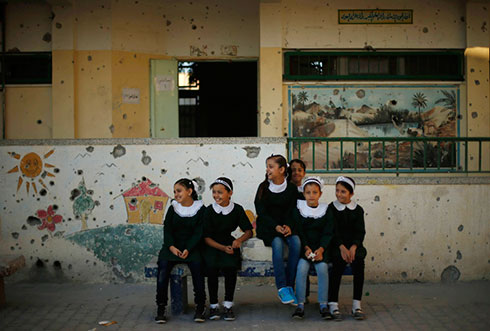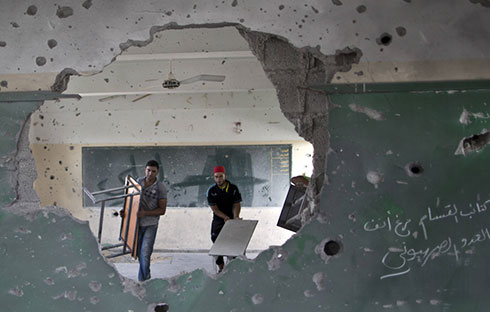
"I don't think that you can ever foresee the need to deal with these kinds of events. When I joined UNRWA, I thought that I would deal mainly with the traditional issues of education and health service for refugees," he said in an interview to Ynet.
But reality has its own plans, and Krähenbühl found himself in the middle of the chaos.
"The first thing that hit me when the conflict erupted was that at the end of the day, after all the analyses in the media, armed conflict affects real people. Whether they are in Gaza or southern Israel. Their lives, their safety, and dignity are in the middle, and that's what guided me through the whole conflict last year," he said.
The relationship between the Israeli public and the organization have always been contentious, but during the conflict relations seemed to reach a major low point.
During the fighting pieces of militant weapons where found in at least two UNRWA facilities, placing the organization in an embarrassing position. "We where the ones who found the weapons stockpiles in our facilities while conducting sweeps," Krähenbühl said.
"The reason the world found out was because we were the ones who told everyone," he said. According to him, sweeping the incidents under the rug was never an option.
"We knew that there would be harsh responses against UNRWA among the Israeli public when we publicized the find, but imagine what would happen if we weren't the ones who publicized it. The publication of the incident should serve to show that we will not stand for it, and will not just forget about it."
"The scale of destruction affected me"
Krähenbühl was born in Switzerland 49 years ago. Before heading UNRWA, he served as director of operations at the International Red Cross for more than a decade. In his previous position, he garnered much experience in conflict zones like Iraq, Syria, Afghanistan, Libya, and Colombia.
It's fair to assume that his experience in such fragile areas shaped his diplomatic abilities. "I'm not a judge, it's not my job to judge what is a war crime or violation of international humanitarian law," he answered when asked if he believes that war crimes took place during the conflict.
"But as a man who worked many years in conflict zones, it would be fair to say that the scale of destruction that I saw in Gaza and its effects on people had a strong influence on me."
He is very cautious with his words, and made an effort throughout the interview to clarify that his criticism is for both sides.
However, with Israel currently fighting a defensive battle against the predicted negative effects of the UN's investigative report on the conflict, it seems he does not entirely agree with Israel's version of events.
"It's obvious that in conflict every party, whether a state or not, is obligated to follow international law. It's often said that Gaza is so tightly populated that when civilians are wounded, it should be forgiven, but I see it differently. It's exactly in this situation that more caution should be exercised, to make sure civilians aren't hurt," he says.
It's clear that the event which had the most effect on him was an IDF strike that hit an UNRWA school in Jabalia, which served as a temporary shelter during the conflict, and took the lives of 20 Palestinians. The strike took place after Palestinian militants fired at IDF troops who where in the vicinity of the school.
The troops returned mortar fire, and as a result the school was hit. In the aftermath of the strike, the military prosecutor announced that the attack was not conducted according to IDF regulations. The prosecutor has since opened a military police investigation into the matter in order to understand the circumstances surrounding the incident.
"The day after the strike I visited the injured children in the hospital, and I saw in their parent's eyes what it means to not be able to protect your child. When I see whole neighborhoods in Gaza that where destroyed by the army, or an UNRWA school that was hit even though we sent the location of the school to the army many times - notifying them that civilians were present, then it is obvious that we would issue statement censuring these actions during the fighting. With that said, when we weren't sure - we did not censure," he added.
The message coming out of the defense establishment in internal briefings and analyses with international officials is that the ratio of civilians to combatants killed was one to one. The army has brought forward examples of other operations by Western states in urban areas, where the ratio was eight civilians for every combatant killed.
It seems that UNRWA is less than impressed by these figures. "The price of the last operation was very high. 540 children killed and 3,000 wounded children don't sit well with the Israeli statement that all the precautions where taken (in order to minimize collateral damage), so now the IDF needs to conduct the necessary investigations. I'm sure that they will do this," he said.
Krähenbühl has criticism for Hamas as well; during the operation he entered the Gaza Strip three times, and on one of those trips did not hesitate to criticize Hamas in front of the world media.
"I was the only high level international official to denounce the rocket fire to Israel, and not from a place where it is comfortable to speak from like Jerusalem or Geneva, but from inside Gaza itself. I can testify about myself that I take international law very seriously, and if I know rockets are purposely being fired at areas where civilians can be hurt, then I will condemn it," he said.
UNRWA had plans prepared even before the operation on how to protect the civilian population of Gaza in the case of conflict. The experience came mainly from the days of operation Cast Lead in 2008, when UNRWA took 50,000 people into its facilities.
However, Operation Protective Edge, which was the largest conflict in Gaza so far, led 300,000 people to seek refuge in some 90 UNRWA facilities throughout the Strip.
"It's a massive number of people," Krähenbühl said. "It's 1.5 times the population of Geneva, the city where I was born," he says.
According to Krähenbühl, if the operation were to happen in Geneva, the city's population would be able to evacuate to other European countries, but in Gaza the residents didn't have any where to go, and that's why the UNRWA facilities were the safest place for them.
On the matter of evacuation he sounds satisfied. However, naturally the process wasn't organized. "It was total chaos; people did not evacuate their homes in an organized manner during the bombings. They left their things for the first place that looked safe," he said.
No one anticipated that the conflict would go on for such a long time, and as the days passed problems began arising from the dense conditions the people where living in.
"You can fit between 80 to 100 people inside one of our school classrooms, but what then? How do you supply basic hygiene products?"
These problems gave way to fighting that often became violent between the evacuees, with UNRWA employees finding themselves in the middle.
Today, a year after the operation, UNRWA continues to house 5,000 Palestinians whose homes where destroyed in its complexes.



















